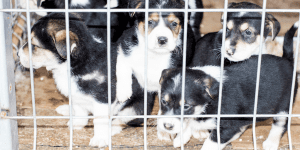Puppy Farming in the UK And How To Spot A Puppy Farmer.
Puppy farming has increased at alarming rates in the last ten years. The increase in puppy farms has been attributed, in part, to the way dogs are portrayed on social media; particularly those owned by celebrities.
In 2019, both the RSPCA and the SPCA (Scotland) reported a massive rise in the number of calls relating to puppy farms, which they say is associated with celebrity dogs on social media. They claim it sets trends and demand for certain types of dogs – typically, cross bred ‘designer dogs’. Read our Holidays4Dogs article for tips on how to spot a puppy farmer.
In April 2020, third party puppy sales were banned in the UK. The legislation was named ‘Lucy’s Law’ after a cavalier King Charles spaniel was rescued from appalling conditions in a puppy farm. It is now illegal for pet shops, or anyone who has not bred puppies themselves, to sell them commercially. Purchasers must be able to see puppies with their mother.
However, Naturewatch Foundation claim that illegal puppy farmers can still flout this law by moving the puppies from ‘farms’ to ‘private homes’. This means potential buyers assume the pups were born on the premises. Some criminals even place adult dogs with the pups, purporting that they are the parents, when they are not.
Puppy Farming.
Puppy farming refers to un-licensed dog breeders who keep multiple animals – breeding them purely for profit. As such, they receive little in the way of care and attention. Animals live in over-crowded cages in unsanitary conditions.
They rarely receive health treatments, such as vaccinations or routine worming. Puppy farms are often located in isolated and remote areas of the UK. Purchasers usually never get to see the environment in which their puppy lived in.
Current licensing legislation is also somewhat murky since different authorities have slightly different rules and regulations.
On top of this, many local authorities simply do not have the resources to regulate and enforce the law.
In addition to an already worrying rise in numbers, covid-19 lockdown periods saw a further increase in the demand for puppies.
Many puppies were illegally imported as demand outstripped supply from reputable sources. According to the RSPCA ‘pandemic puppies’ encouraged illegal trade.
The influence of social media on puppy farming.
As well as this, in 2020, a story hit the news headlines about celebrities being offered free dogs by puppy breeders and dealers. Social media influencers were offered free, or discounted puppies, in return for publicizing breeders and their puppies. Some celebrities spoke out about this unscrupulous practice of giving dogs away in this manner.
The focus breeder in the story was ‘Tiffany Puppies’ based in Cheshire. The breeder Elena Katerova admitted to importing puppies from Russia. However, she claimed buyers were able to see puppies with their mother on videos.
Despite ‘Lucy’s Law’ breeders like Katerova still manage to side-step the law. Un-licensed breeders continue to breed puppies in terrible conditions. Malnourished and sick puppies are then frequently transported long distances to be sold.
Indeed, the illegal importation of puppies tends to be associated with the puppy farming trade. Despite measures by the UK government to crack down on these appalling practices, puppy farming and puppy smuggling is still a significant problem.
Avoiding puppy farmers.
For every puppy sale that happens through a puppy farmer, this appalling trade can continue to thrive. It is therefore very important that prospective purchasers avoid unscrupulous breeders. First, it is crucial to research the type of dog you are looking for. Contact breeders from reputable sources, such as the Kennel Club.
First, it is crucial to research the type of dog you are looking for. Contact breeders from reputable sources, such as the Kennel Club.
Avoid looking at internet classifieds such as gumtree, as these are the sort of places puppy farmers advertise. Puppy farmers move dogs around the country.
If you see the same adverts or photographs for puppies for sale in Preston and Bristol, chances are you are dealing with a puppy farmer. It’s crucial to be aware of the tricks puppy farmers will go to.
Many disreputable breeders will advertise puppies using cute photographs in cosy surroundings. However, puppy dealers very often raise the animals in very different conditions.
Contacting and visiting puppy breeders.
Find out as much as you can about the litter, by calling the breeder on the telephone. A reputable breeder will be more than happy to chat to you and in fact, many will expect it. Puppy farmers won’t care.
Never pay for a puppy without seeing it first with its mother. Don’t fall for excuses as to why the mother is not with the puppies. Typical reasons given by puppy farmers for the absence of the mother are, ‘she’s at the vets’ or, ‘ she does not like strangers touching the puppies’.
Some puppy farmers will even go to the lengths of putting puppies with a fake mother, so make sure the mother and pups are interacting and preferably suckling.
a fake mother, so make sure the mother and pups are interacting and preferably suckling.
Don’t allow a breeder to push you into a purchase and don’t buy because you feel sorry for the puppy.
If you are suspicious about the breeder and/or the premises, leave straight away and inform the RSPCA and the police. If you suspect a breeder is operating without a licence, you can report them to your local authority.
Conclusion.
Sadly, puppy farming is still a worrying problem that continues all over the UK. While organizations such as the RSPCA and the government attempt to close down these establishments, it is important the general public help too. If you are thinking of buying a puppy, watch out for illegal puppy farmers. They are still out there.
There are a number of reasons why it is often better to choose a rescue dog and you can read our other Holidays4Dogs article on giving rescue dogs a second chance.


